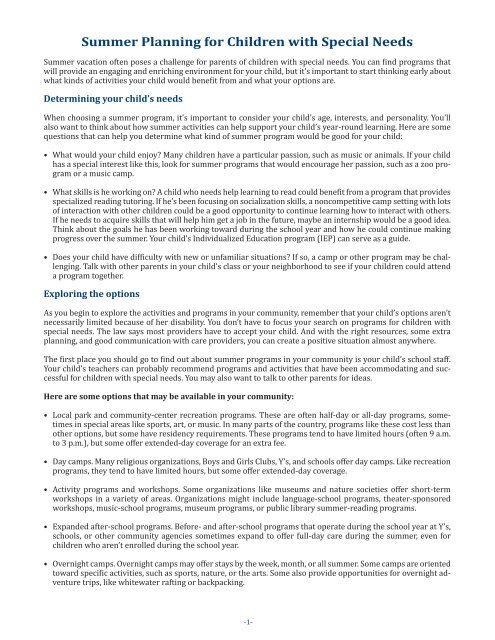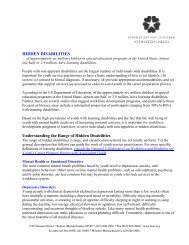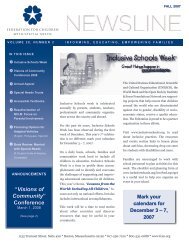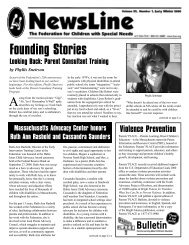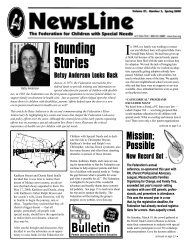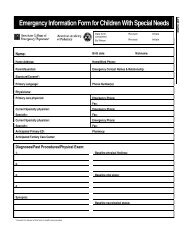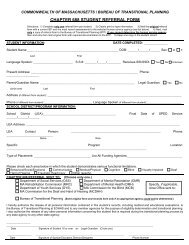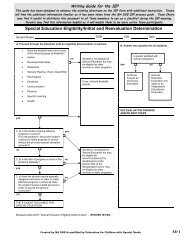Summer Planning for Children with Special Needs (PDF)
Summer Planning for Children with Special Needs (PDF)
Summer Planning for Children with Special Needs (PDF)
Create successful ePaper yourself
Turn your PDF publications into a flip-book with our unique Google optimized e-Paper software.
<strong>Summer</strong> <strong>Planning</strong> <strong>for</strong> <strong>Children</strong> <strong>with</strong> <strong>Special</strong> <strong>Needs</strong><strong>Summer</strong> vacation often poses a challenge <strong>for</strong> parents of children <strong>with</strong> special needs. You can find programs thatwill provide an engaging and enriching environment <strong>for</strong> your child, but it’s important to start thinking early aboutwhat kinds of activities your child would benefit from and what your options are.Determining your child’s needsWhen choosing a summer program, it’s important to consider your child’s age, interests, and personality. You’llalso want to think about how summer activities can help support your child’s year-round learning. Here are somequestions that can help you determine what kind of summer program would be good <strong>for</strong> your child:• What would your child enjoy? Many children have a particular passion, such as music or animals. If your childhas a special interest like this, look <strong>for</strong> summer programs that would encourage her passion, such as a zoo programor a music camp.• What skills is he working on? A child who needs help learning to read could benefit from a program that providesspecialized reading tutoring. If he’s been focusing on socialization skills, a noncompetitive camp setting <strong>with</strong> lotsof interaction <strong>with</strong> other children could be a good opportunity to continue learning how to interact <strong>with</strong> others.If he needs to acquire skills that will help him get a job in the future, maybe an internship would be a good idea.Think about the goals he has been working toward during the school year and how he could continue makingprogress over the summer. Your child’s Individualized Education program (IEP) can serve as a guide.• Does your child have difficulty <strong>with</strong> new or unfamiliar situations? If so, a camp or other program may be challenging.Talk <strong>with</strong> other parents in your child’s class or your neighborhood to see if your children could attenda program together.Exploring the optionsAs you begin to explore the activities and programs in your community, remember that your child’s options aren’tnecessarily limited because of her disability. You don’t have to focus your search on programs <strong>for</strong> children <strong>with</strong>special needs. The law says most providers have to accept your child. And <strong>with</strong> the right resources, some extraplanning, and good communication <strong>with</strong> care providers, you can create a positive situation almost anywhere.The first place you should go to find out about summer programs in your community is your child’s school staff.Your child’s teachers can probably recommend programs and activities that have been accommodating and successful<strong>for</strong> children <strong>with</strong> special needs. You may also want to talk to other parents <strong>for</strong> ideas.Here are some options that may be available in your community:• Local park and community-center recreation programs. These are often half-day or all-day programs, sometimesin special areas like sports, art, or music. In many parts of the country, programs like these cost less thanother options, but some have residency requirements. These programs tend to have limited hours (often 9 a.m.to 3 p.m.), but some offer extended-day coverage <strong>for</strong> an extra fee.• Day camps. Many religious organizations, Boys and Girls Clubs, Y’s, and schools offer day camps. Like recreationprograms, they tend to have limited hours, but some offer extended-day coverage.• Activity programs and workshops. Some organizations like museums and nature societies offer short-termworkshops in a variety of areas. Organizations might include language-school programs, theater-sponsoredworkshops, music-school programs, museum programs, or public library summer-reading programs.• Expanded after-school programs. Be<strong>for</strong>e- and after-school programs that operate during the school year at Y’s,schools, or other community agencies sometimes expand to offer full-day care during the summer, even <strong>for</strong>children who aren’t enrolled during the school year.• Overnight camps. Overnight camps may offer stays by the week, month, or all summer. Some camps are orientedtoward specific activities, such as sports, nature, or the arts. Some also provide opportunities <strong>for</strong> overnight adventuretrips, like whitewater rafting or backpacking.-1-
Again, keep in mind that it’s against the law <strong>for</strong> a provider to tell you that your child cannot be admitted to a programbecause of his disability. Also remember that many options and ideas are available <strong>for</strong> making a situationwork. For example, if your child needs one-on-one assistance at a camp but the camp cannot provide this, yourinsurance company or state department that oversees the welfare of children <strong>with</strong> disabilities may be able to pay<strong>for</strong> an extra teacher, aide, or counselor.Taking a closer lookOnce you have found a handful of programs you think might work, it’s time to do some in-depth research. Here aresome questions you might ask as you learn more about each program.• What is the program philosophy? Well-run camps have clearly stated goals. Look <strong>for</strong> programs that will bea good match <strong>with</strong> your child’s personality and increase her sense of confidence and self-esteem. Considerwhether your child will do better in a competitive environment or one that is cooperative.• How much training and experience do staff members have? Will they welcome your child or be intimidated byher? Teenagers earning a summer salary can be wonderfully enthusiastic; in some cases, though, well-trainedadults might provide a better experience <strong>for</strong> your child. Are staff members able to make needed accommodations?Are they willing to work closely <strong>with</strong> your child’s aide? Can they effectively manage your child’s behaviorin a way that makes you feel com<strong>for</strong>table?• What is the ratio of staff members to kids? A program <strong>with</strong> one adult <strong>for</strong> every two children will be quite differentfrom a program <strong>with</strong> one adult <strong>for</strong> every ten. If your child will be attending camp, you should consider thestaffing guidelines of the American Camp Association (ACA), which take into consideration the age and specialneeds of participants. For example, the ACA recommends a ratio of 1:1 <strong>for</strong> campers <strong>with</strong> severe mental disabilities.Check the ACA Web site at www.acacamps.org <strong>for</strong> more in<strong>for</strong>mation.• What kind of medical facilities or professionals are on site? Find out if a nurse is available and how medicationsare dispensed. If your child needs medication or may need other medical care, you will want to be sure that theprogram has good personnel and procedures in place. For example, if your child takes insulin, be sure that thereis a designated, safe storage area <strong>for</strong> the medication. Also make sure that the camp staff is trained to respond tomedical emergencies, such as seizures.• Are the facilities accessible? Remember that solutions are available to many accessibility issues, but those solutionswill only be successful if the program staff is willing to work <strong>with</strong> you.• How will you communicate <strong>with</strong> staff members and <strong>with</strong> your child? If your child will be attending a day program,find out if you will have opportunities to speak <strong>with</strong> counselors at drop-off and pick-up time. Will staffmembers be readily available by phone or e-mail? If your child will be attending an overnight camp, find out howoften you will be able to speak <strong>with</strong> him.• What are the sleeping, bathing, and eating arrangements? If you are considering overnight camp, you will wantto be sure that your child will be com<strong>for</strong>table and will get the help she needs to be able to fully participate in theprogram. If your child requires a special diet, make sure the camp can provide it.• What do other parents think of the program? No matter what kind of program you are considering, ask <strong>for</strong> references,and try to talk to at least three parents to get a good idea of what you and your child can expect.Paying <strong>for</strong> your child’s summer programSome programs, especially those designed specifically <strong>for</strong> children <strong>with</strong> special needs, can be expensive. But it’s amistake to avoid looking at these programs just because of the cost. You may have more options than you think.You may be able to get some or all of the cost <strong>for</strong> your child’s summer program paid <strong>for</strong> by your school district. Ifyou can prove that your child will be working on the skills outlined in his IEP at the summer program, the schooldistrict may pay <strong>for</strong> it. Be sure to talk <strong>with</strong> school or district administrators early in the process if you will be asking<strong>for</strong> the school district to cover some or all of the cost of your child’s summer program.-2-
Making it workChoosing a summer program or activity is only the first step toward creating a fun and enriching summer <strong>for</strong> yourchild. You’ll also need to develop a plan to communicate <strong>with</strong> the staff at the program or camp and take other stepsto ensure your child’s experience is a positive one. Here are some tips that can help:• Get to know the camp or program staff. Visit the camp site and make arrangements to meet as many programstaff members as you can. A good relationship <strong>with</strong> staff members is the best way to ensure your child has agreat experience.• Ask who should be your main point of contact. You’ll want to have lots of day-to-day communication <strong>with</strong> counselorsor staff members, but it’s also a good idea to develop a relationship <strong>with</strong> one administrator or programdirector. This is the person you’ll call whenever you have any concerns or questions. Make sure your contactperson knows how to reach you at work and at home and encourage her to call you <strong>with</strong> any in<strong>for</strong>mation, negativeor positive.• Educate staff about your child. It’s important that any staff members who will be interacting <strong>with</strong> your childunderstand his condition or disability. If you have brochures about the condition, distribute those. You can alsoprint fact sheets off the Internet or get them from your health care provider. In addition to understanding yourchild’s specific condition, it’s important that the staff learn something about your child personally. For example,if your child does best when she is interacting <strong>with</strong> calm, very patient teachers or counselors, let people at theprogram know this so that they can match her up <strong>with</strong> the right staff members.• Look <strong>for</strong> ways to support the program. Small gestures, like bringing in popsicles on a hot day or volunteeringto run a booth at the summer carnival, will let staff and other families know how much you appreciatetheir hard work. You may also be able to lend your support through fund-raising activitiesin your community.• Thank everyone who worked to make your child’s summer a success. Thank counselors, staff, and other children<strong>for</strong> everything they did to help your child. If a staff member was especially helpful, consider writing a letter ofthanks and sending a copy to the program director or governing board.ResourcesAmerican Camp Association (ACA) www.acacamps.org. The ACA is the national accrediting organization<strong>for</strong> camps and provides a wealth of in<strong>for</strong>mation and resources <strong>for</strong> campers <strong>with</strong> and <strong>with</strong>out specialneeds.Internet <strong>Special</strong> Education Resources (ISER) www.iser.com. The ISER is a nationwide directory of professionals,organizations, and schools that serve the learning disabilities and special education communities.It helps parents and caregivers find local special education professionals to help <strong>with</strong> learningdisabilities and attention deficit disorder assessment, therapy, advocacy, critical teen issues, and otherspecial needs.Kids Camps.comwww.kidscamps.com. This online directory of camps all over the U.S. includes listings of camps <strong>for</strong>children <strong>with</strong> special needs.Written in collaboration <strong>with</strong> the Parent Training and In<strong>for</strong>mation Center at the Federation <strong>for</strong> <strong>Children</strong><strong>with</strong> <strong>Special</strong> <strong>Needs</strong> (www.fcsn.org), a non-profit organization committed to listening to and learning fromfamilies and encouraging full participation in community life by all people, especially those <strong>with</strong> disabilities.© 2006 Ceridian Corporation. All rights reserved.-3-


